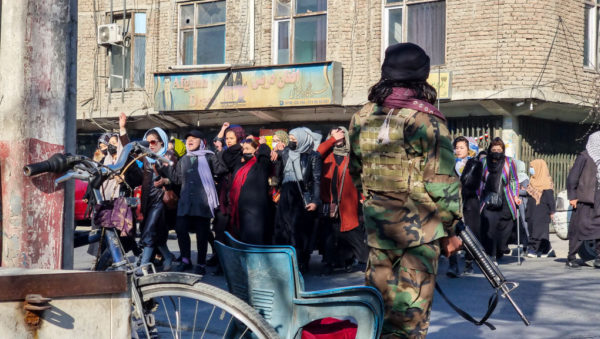

Afghan women protest against Taliban ban on women accessing university education on December 22, 2022 in Kabul, Afghanistan - Stringer/Getty Images
Two Years Later: Afghan Women Struggle to Survive under Taliban Rule
By Niala Mohammad , Salam Al-Marayati
US
August 15th, 2021, marked a turning point in Afghanistan's history as the Taliban seized control, following the withdrawal of US troops, casting a shadow of uncertainty over the nation's future — particularly for Afghan women, who had fought to reclaim their place in society after enduring years of relentless conflict. Despite promises to uphold women's rights in accordance with Islamic teachings, the Taliban's actions have only served to undermine the very religion they purport to represent.
Over the past two years, the Taliban's Ministry for the Propagation of Virtue and the Prevention of Vice (MPVPV) has issued a series of Islamic decrees that have severely restricted the rights and freedoms of Afghan women. These decrees have encompassed various aspects of women's lives, including education, employment, healthcare, and participation in sports. For example, the Taliban wasted no time closing girls' secondary schools shortly after taking control of Afghanistan, leaving Afghan women and girls without access to education beyond the age of 12.
Under current Taliban rule , women are prohibited from traveling beyond a distance of 75 km (approximately 46 miles) from their homes without a male relative accompanying them as a chaperone. This restriction severely hampers women's ability to move freely and independently, further confining them to their immediate surroundings.
They have also taken steps to erase the visibility of women from public spaces, banning the representation of women on television and in advertisements, including the use of billboards and mannequins in shops. This deliberate erasure of women from public sight not only reinforces their marginalization but also sends a chilling message about their place in society under Taliban rule.
Furthermore, the Taliban has imposed strict limitations on women's healthcare, stating that women can only receive medical treatment from female doctors and nurses. This insistence from the Taliban is especially contradictory when they simultaneously deny women the right to education, highlighting the arbitrary nature of their policies and lack of coherence in their approach to women's rights. This restriction, coupled with the already dire state of healthcare in Afghanistan — where maternal, infant, and child mortality rates are among the highest in the world — will have a devastating impact on the well-being of Afghan women and children.
Access to mental healthcare is also scarce, leaving countless women battling depression, anxiety, and post-traumatic stress disorder without proper support. The dire economic circumstances and lack of opportunities in Afghanistan have also led to a distressing situation in which young girls are sold by their families . Last year, the United Nations Human Rights Council reported that the situation for women in Afghanistan has become so desperate that they are resorting to suicide at an alarming rate, with one or two women taking their own lives every day.
The weaponization of Islam
Under Taliban rule, Afghan women are subjected to strict dress codes to adhere to their interpretation of Islamic norms, including the wearing of burqas. They have also issued decrees instructing women to avoid wearing bright-colored clothing, high-heeled shoes, and perfume, as they believe these items may attract attention from the opposite sex.
Most recently, in July 2023, the Taliban banned women's beauty salons, depriving women of communal spaces and sources of income. They justified these closures by citing certain beauty salon services that they deemed to violate Islamic principles: eyebrow shaping, hair extensions, and the application of makeup and nail polish — all of which they claimed interfered with the ablutions required before offering prayers.
This ban on beauty salons not only strips women of their livelihoods but also denies them spaces where they can gather, socialize, and seek support from one another. It further reinforces the Taliban's oppressive control over women's bodies and personal choices, as they dictate what is deemed acceptable and appropriate according to their narrow interpretation of Islam.
The Taliban's strict cultural interpretation of Sunni Islam has also led to targeted violence against Afghans who do not conform to their ideology, particularly those who vocalize their dissent and advocate for their rights, including women’s rights, which they deem as Western influence.
The Taliban's decrees have resulted in the severe marginalization of women and girls in all aspects of Afghan society, which they exploit to gain attention on the global stage. In July 2023, US State Department officials — including Special Representative for Afghanistan Thomas West, Special Envoy for Afghan Women, Girls, and Human Rights Rina Amiri, and Chief of the US Mission to Afghanistan based in Doha Karen Decker — held discussions with all-male senior Taliban representatives in Doha, Qatar urging them to reverse their policies that have led to the deteriorating human rights situation in Afghanistan. However, the Taliban's statement following the meeting focused on issues such as economic stability, removing blacklists and lifting sanctions, unfreezing DAB (Afghanistan's central bank) reserves, countering narcotics — and then human rights, and without really addressing the specific human rights concerns raised by the US delegation.
It is evident that the Taliban is using women's rights as a bargaining chip for international recognition and the lifting of sanctions. They continue to impose restrictions on women under the guise of Islam, exploiting the global Muslim community's silence on this matter. It is crucial for the Muslim community worldwide to speak up against this cruelty and challenge the Taliban's distorted interpretation of Islam.
Contrary to the Taliban's propaganda, human rights and women's rights are not exclusive to Western values. They are fundamental principles rooted in Islamic teachings. However, groups like the Taliban manipulate and pervert sacred texts to gain power and control. It is essential to recognize and challenge these perversions, standing up for the rights and dignity of Afghan women until they can enjoy the freedoms they deserve. Women's Media Center/MPAC

